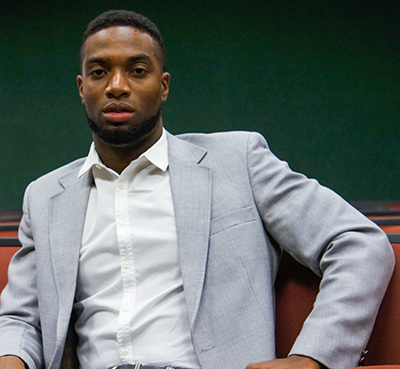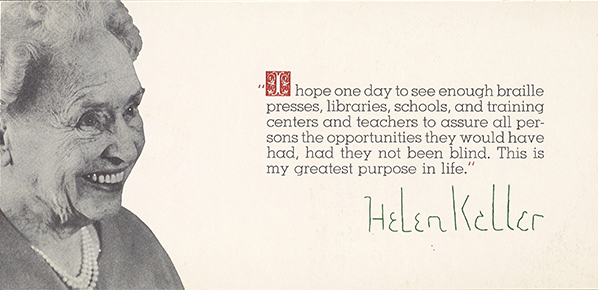Introduction
Hello, AFB community, I'm Lorenzo Amani, currently a second-year doctoral student at Virginia Tech in the College of Public Administration and Public Affairs. I'm also a graduate assistant for Virginia Tech's Office of Budgeting and Financial Planning. My research interests are in labor market policy analysis, human capital management, and workforce development. I'm assisting the AFB staff this summer to develop various research designs that could inform employment and workforce development practitioners who serve people who are blind or visually impaired. Thus far, I've learned of the many challenges of this endeavor. Most challenging is the lack of specific employment data and the varying metrics or lack thereof for measuring employment outcomes.
The AFB Experience
Working at AFB has been an astonishing learning experience for me. I was exposed to blind baseball, blindness simulations, accessibility demonstrations, and I typed my name in braille using a Perkins braille writer! Paul Schroeder demonstrated how Google Glass technology is being used to increase mobility for people with vision loss. Mark Richert (AFB's Director of Public Policy) impressed me with his positive outlook, and how seamlessly he navigated the office space and public transportation in the city. After speaking with Lou Tutt (Executive Director of the Association for Education and Rehabilitation of the Blind and Visually Impaired) and Rebecca Sheffield (AFB's Senior Policy Researcher) about their journeys in the field. I'm convinced that practitioners in this field are unique in their passion and spirit towards serving others. The conversations and direct observations that I've had with the AFB team and the blindness community have deconstructed my subconscious assumptions about the capabilities of people with vision loss. I'm very much appreciative of such a pleasant and enriching experience.
Call for Research from the Labor Market Perspective
As a scholar of labor market policy, I believe that observing employment conditions (through a descriptive labor market outcomes framework) is relevant to AFB's mission and could aid in the development of solutions to address the overall employment rate for citizens who experience blindness or vision loss. Thinking about the relationships within two microeconomic frames, each comprised of two areas, has helped me theorize applicable research questions and hypotheses. The two frames of labor-market behaviors and outcomes are labor supply and demand.
Under the labor supply frame, the two areas are households and educational institutions, which are the entities that discover, cultivate, and produce aptitudes and skills that are sold as labor supply in the labor market (Jacobsen & Skillman, 2004; Rima, 1996).
For the labor demand frame, the two areas are government and firms. Firms are the source of demand for labor in the labor market, and government is the rule-making entity that intervenes as necessary to influence the demand and supply sides of the labor market in pursuit of a stable and/or healthy economy (Jacobsen & Skillman, 2004; Rima, 1996).
I propose that these frames and areas will help to shape an important approach to employment research in the field of blindness and visual impairment.
In a short time, I've gained a considerable amount of knowledge of the challenges and opportunities that are inseparable from goals of helping citizens with blindness or vision loss live fulfilled lives. Studies have shown that meaningful employment leads to a greater sense of independence and purpose, and there are many organizations such as the Association for Education and Rehabilitation of the Blind and Visually Impaired and the National Industries for the Blind, who work tirelessly on supporting gainful employment. In consideration of my statement on the importance and relevance of labor market perspectives, I ultimately want to discover ways to increase the skill and talent levels of citizens with vision loss through households and educational institutions and decrease the barriers of employment by 1) using government policies and 2) addressing firms' behavior to influence their hiring practices. To put it simply: increase talent and decrease barriers.
Research is essentially a methodical form of storytelling. If we can better tell the employment story of citizens in the blindness community, then households and educational institutions will be able to better prepare citizens with vision loss for gainful employment. Simultaneously, policy makers and hiring managers will be better informed on how reduce structural and subjective employment barriers.
At face value, this benevolent endeavor could appear oblivious to the substantial challenges surrounding the employment issue. Nonetheless, I firmly believe that employment research can produce real outcomes, by asking the right employment questions and building an evolving database centered around labor market statistics for people with vision loss.
Undoubtedly, there are many ways to approach this type of research. Yet, in consideration of feasibility, accuracy, and AFB's vision, first we plan to observe the employment outcomes that can be attributed to the implementation of the Workforce Innovation and Opportunity Act (WIOA) by vocational rehabilitation state agencies. I'll look at how state vocational rehabilitation agencies measure their employment outcomes to identify areas for improvement, while using labor market and workforce development theories to make a normative push for how state vocational rehabilitation agencies should measure their employment outcomes.
At a minimum, the data gathered will add to the literature in the field. Most importantly, it can help AFB and other related organizations influence policy with verifiable employment data.
Final Thoughts
In conclusion, I stumbled upon a quote from Helen Keller this week.
When I encountered this quote, I felt the spirit of her, every person, organization, and entity who works tirelessly to support people with disabilities, especially those with limited or no vision. Helen stated, "I hope one day to see enough braille presses, libraries, schools, training centers, and teachers to assure all persons the opportunities they would have had, had they not been blind. This is my greatest purpose in life." (AFB Press, 2000).
Through my research perspective, I interpreted her use of the word "opportunities" to signify "employment opportunities," which are key to engendering purpose, independence, liberty, and ultimately life fulfillment. Through a collaborative, scrupulous, and focused research agenda, AFB can continue to have considerable influence in advancing equality and opportunity in the lives of people with vision loss.
References
Keller, Helen (2000). To Love This Life: Quotations by Helen Keller. New York, NY: AFB Press.
Jacobsen, J. P., & Skillman, G. L. (2004). Labor markets and employment relationships: A comprehensive approach. Malden, MA: Blackwell Pub.
Rima, I. H. (1996). Labor markets in a global economy: Macroeconomic perspective. Armonk, NY: Sharpe.

